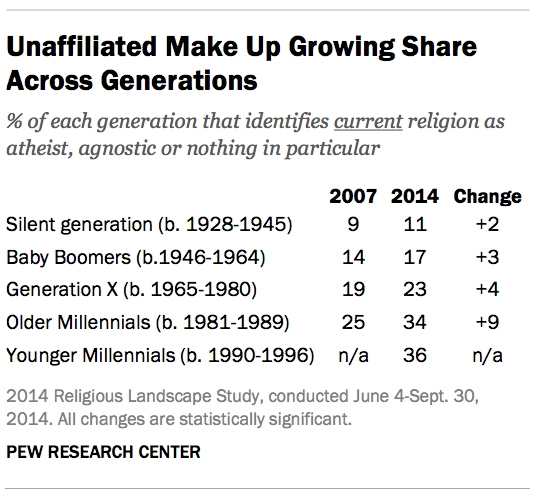We all disagree with each other over almost everything. And this is also true with the various interpretations of the decline of Christianity as documented by the latest Pew Report.

Many are sure that the reason for the decline stems from decisions those who disagree theologically have made.
In other words, those on one side of the fence are sure it is because the “liberals” have watered down the Gospel and have become corrupted by current, secular, and immoral ethical/sexual standards. Thus they have alienated many in the US from the true teachings of Christianity.
In the same vein, those on another side of the fence are sure that the “conservatives” are so legalistic that they have bought into hate-filled exclusionary stances, particularly in relation to ethical/sexual standards. Thus they have alienated many in the US from the true teachings of Christianity.
Now, who is wrong? Although both violate many Christian teachings in their generalizations and disdain for each other, neither is wrong.
Both can and do have sound biblical and theological arguments to support their views and decisions. Both can cite work by reputable scholars to support their stances. Both can claim the higher moral ground. Both see Jesus on their side.

The result: “Cut the baby is half.” So says King Solomon (1 Kings 3:16-28) when two women come to him, both insisting the infant in question is their own.
And so the church has splintered itself over the years. We have convinced ourselves that the action of cutting in half is ultimately more useful than continuing to work out the complications of connection with those who see the world of faith with radically different eyes than our own.
Now, the analogy quickly breaks down here: In the King Solomon case, only one claimant was right: the birth mother. But keep in mind she was also the one who said, “Life for this child without me is better than death with me” and bowed out, knowing that her decision would lead to unbearable loss and grief. In so many ways, she modeled the Christ act: “Father, forgive them, because they don’t know what they are doing.” She was willing for unrighteousness to reign with the hope that redeeming love would ultimately win.
To return to the Pew Report: despite multiple analyses of why Christianity is declining in the US, no one has the total answer. But blaming the “other” for the decline has never worked. All that does is accelerate the decline. The non-religious, non-affiliated look and say, “Well, why bother with a religious tradition that causes such discord?”
Real hope here lies in recognizing that, as easy as it is to point the finger at the excesses of those who disagree, we’re all looking to get a handle on Truth. We are all seeking to know God, the Holy and Righteous One, the Creator, the Cosmic Lover, the One who holds the entire universe together in redemptive love.
In our search, it is also important to acknowledge that the nature of that kind of Truth is too big for one person or one religious tradition to fully encompass.
The nature of unity has nothing to do with the nature of unanimity.
Jesus clearly said, “The left hand does not know what the right hand is doing.” As one who is quite uncoordinated physically (as in the words “eye and hand” simply do not belong in the same sentence), I know what is it like for one side of my body not to know what the other side is doing. Awkwardness accompanies such lack of knowledge. But it still beats cutting my body in half so there would be less tension between one side and the other. Both sides perceive truth; neither does it perfectly.
As is much of my writing, I am speaking specifically to the situation within The United Methodist Church, historically a major force for societal good and personal redemption. From what I have seen, every time someone floats a proposal for maintaining unity while not insisting everyone be on the same page theologically, it is shot down by those who advocate for greater doctrinal purity, with the definition of “purity” depending upon the viewpoint of the critic.
Yet doctrinal purity appears to be the one thing that Jesus particularly spoke against. One of my favorite passages of scripture comes from Mark, chapter 3.
Jesus is in the gathering place on the Sabbath. A man with a withered hand is there. The pure-doctrine people watch Jesus closely: if he healed someone on the Sabbath, it would make their case against him as one who had no regard for the law.
Despite the danger to himself, Jesus heals the man. And the pure-doctrine people strengthen their plot to kill Jesus, a plan that was ultimately successful.
Yes, Christianity is declining. All the Pew Report did was publicize it in a more systematized way. But institutionalized, politically backed Christianity is a bad idea anyway. A good idea is a movement of people who wish to live out of deep love for God and for one another, joined together in their quest for the kingdom of heaven. Those things are the sum of the law, that very thing that the pure-doctrine people call for.
It may be that some, out of deep love for God and for one another, will have to say, “Let her have the baby.” If so, it will be said with enormous grief and nearly unbearable loss, including significant financial loss on the part of many. But if it becomes necessary to say this, perhaps it can be done with the choice to celebrate life, not rightness. Again, the words of Jesus, “I have come to give you life, and life abundantly.” He gave up his life in order to do that.
We are called to love our enemies, to do for them far more than they may ask us of us. I saw that happen with my son and his wife. The birth mother before Solomon did the same thing.
What will you and I do?
















